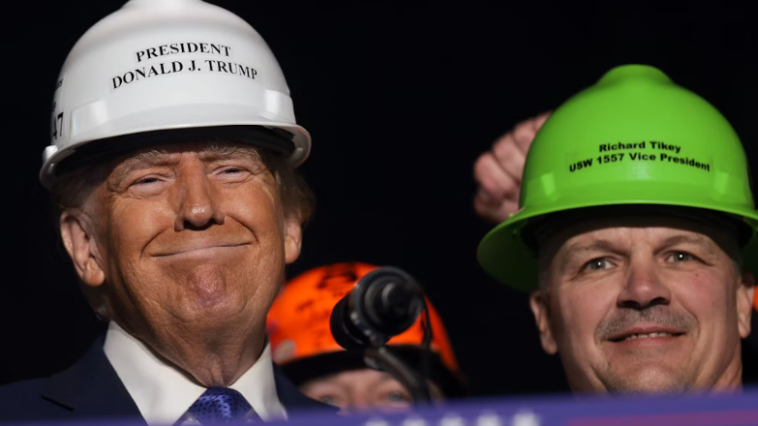In a bold move to protect American manufacturers and address long-standing trade imbalances, President Donald Trump has announced a 25% tariff on all steel and aluminum imports, set to take effect this coming Monday. The decision underscores Trump’s commitment to revitalizing U.S. industry and holding foreign competitors accountable for unfair trade practices.
“Any steel coming into the United States is going to have a 25 percent tariff. Aluminum, too,” Trump declared during a press conference. “Very simply, if they charge us, we charge them.”
Targeting Trade Imbalances and Unfair Competition
The tariffs will impact major steel exporters to the United States, including Canada, Brazil, and Mexico. In 2024, Canada led steel imports with 6.39 million metric tons, followed by Brazil with 3.49 million and Mexico with 2.85 million metric tons. Aluminum imports are also dominated by Canada, accounting for 39% of the total, with China and Mexico following.
Trump’s move comes amid ongoing concerns that foreign producers, particularly those benefiting from government subsidies and lower labor costs, have undercut American companies. “This is about protecting American workers,” Trump emphasized. “We won’t stand by while our industries are taken advantage of by nations that play by a different set of rules.”
A History of Taking Action on Trade
This is not the first time the Trump administration has used tariffs as leverage. In 2018, similar tariffs on steel and aluminum imports led to renegotiations of key trade deals, including a revamped NAFTA agreement—now the United States-Mexico-Canada Agreement (USMCA). Trump’s tough stance on trade has previously yielded significant concessions from international partners, including Canada’s commitment to enhancing border security and addressing the flow of illegal drugs into the U.S.
“When we negotiate from strength, we win,” said a senior Trump administration official. “These tariffs are about leveling the playing field and ensuring that American workers get a fair shot.”
A Strategic Blow Against China’s Steel Dumping
China, while not the largest direct exporter of steel to the U.S., has been a major player in global steel dumping—flooding markets with cheap products that lower global prices and hurt domestic producers. The 25% tariff signals a clear message that the U.S. will not tolerate predatory trade practices.
By targeting steel and aluminum, two key industries critical to national infrastructure, defense, and manufacturing, Trump is also reinforcing America’s strategic economic resilience. “We’re not just talking about jobs here,” said an administration economist. “This is about national security. Our country must be able to produce its own steel and aluminum without being dependent on foreign suppliers.”
Backlash from Trade Partners and Global Markets
While supporters see the tariffs as a necessary step to restore American manufacturing dominance, some trading partners and global organizations are warning of possible retaliation. Canada and the European Union have already indicated they may consider countermeasures, potentially targeting U.S. goods such as agriculture products.
However, the administration has made it clear that it will not be intimidated. “We’re done with bad deals,” Trump said. “This is a new era for American trade.”
Protecting American Workers and Industries
Trump’s tariffs come at a time when many American steelworkers and manufacturers have been calling for relief from foreign competition. Domestic producers have long argued that without protections, they would be forced to shut down plants and lay off workers, leaving the U.S. vulnerable to foreign market domination.
“This is exactly what our industry needs,” said a spokesperson for a major U.S. steel producer. “We’re grateful to the Trump administration for taking real action.”
Conclusion: A New Era in Trade Policy
With the 25% tariff on steel and aluminum imports, President Trump is once again delivering on his promise to put American workers first. The policy sends a clear message to foreign governments: if you undercut American industry or impose unfair duties on U.S. goods, expect swift and decisive retaliation.
As the new tariffs take effect, the administration is betting that foreign nations will come back to the table, willing to negotiate trade terms that benefit both sides—but on America’s terms.


